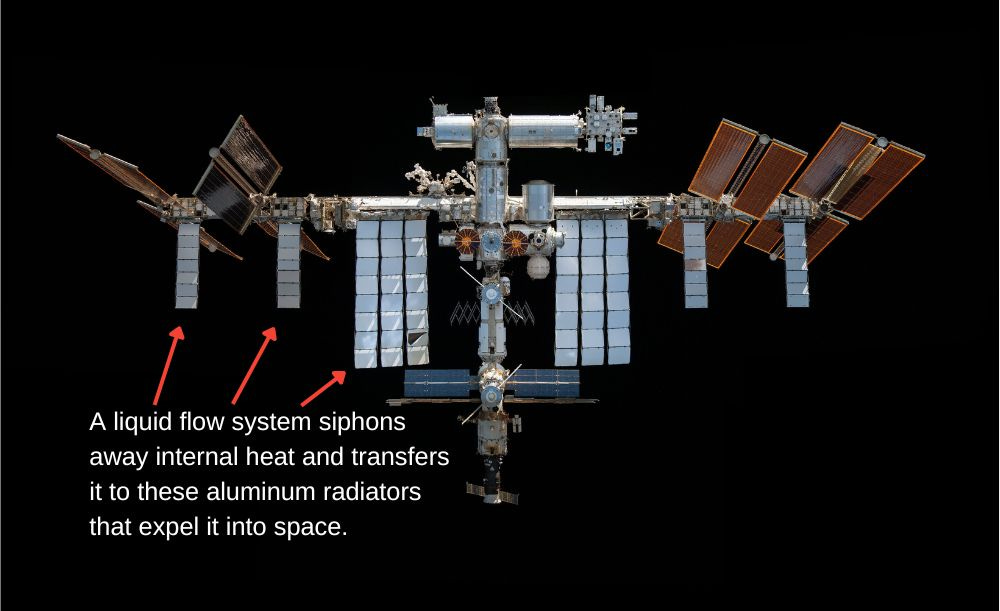Happy Monday All,
This episode is nerd-tastic!
It’s about one of the most fundamental engineering challenges that rates in priority probably right after launch and structural integrity: environmental control.
My guest is Purdue University Mechanical Engineering’s Prof. Issam Mudawar, who says his NASA-funded experiment underpins the development of crucial environmental technology that almost every spacecraft - crewed or not - and every off-world human habitat will employ.

Environmental control is not an alien concept to those who aspire “to boldly go” well beyond the Kármán Line. Yes. I know that’s without “to explore strange new worlds”, etc. But folks, we’re still firmly planted on 21st century Earth, and according to some recent and riveting congressional testimony, “new life and new civilizations” have boldly come to us.
But, if you have watched an episode or two of Star Trek, “environmental controls” is a constant in the script, whether it is the system from which extra energy can be siphoned to strengthen deflector shields, or the reason why, say after a direct hit from a Gorn phaser emitter, that decks 7 through 10 are uninhabitable and must be evacuated. Those are the fantastical examples.
The Trek example that is applicable to today comes from Voyager’s Captain Kathryn Janeway, in the episode “Macrocosm”, which aired December 11, 1996: “When environmental controls fail, heat from the warp plasma conduits can't be vented. Expect a heat wave before long.”
Too much heat can kill astronauts and the electronics they depend on.
The process to vent or expel heat from spacecraft, no matter whether it is crewed or not, has been solved, but with large, and therefore heavy, inefficient 20th Century technology. It’s similar to a car in that it depends on liquid coolants, that remain in a liquid phase when heated or chilled. It’s called a single phase flow system.
Mudawar, his team of doctoral students, and NASA’s Glenn Research Center are working on creating the engineering and design tools to build a more modern, more efficient, lighter, and therefore less expensive way to keep humans and electronics comfy in space. To do that, they have to understand how and why water molecules behave the way they do in the liquid and vapor phases in microgravity, where steam bubbles do not float up and away from a heat source.
Earlier this month, the second module of Mudawar’s Flow Boiling & Two-Phase Condensation Experiment (FBCE) arrived at the ISS and was installed next to the first module in the Fluid Integrations Rack. Mudawar told me this is the first ever at scale experiment of its kind in a non-Earth gravity environment.
NASA expects this experiment to provide the data critical to maintaining environmental control for humanity’s off-world ambitions in exploration, commerce, defense, and colonization.
If after listening to the episode, you find yourself inspired to go below the surface, go here to the Flow Boiling and Condensation Experiment (FBCE) page hosted by NASA’s Glenn Research Center. It’s got all the journal papers produced from the experiment’s first module, images, and progress and activity summaries that do not require a science or engineering degree to understand.
If you want to look at cool images, the experiment’s design, or puzzle over equations that do require a degree in engineering to understand, read “Photographic study and modeling of critical heat flux in horizontal flow boiling with inlet vapor void”.
The DownLink is a Defense & Aerospace Report podcast. If you want to get the latest defense news and analysis from the other operational domains, the Defense & Aerospace Report should be your first stop.
Need your vote!
Some good people I know from Bellwether International are sponsoring a proposed panel discussion about the importance of technology and storytelling in revealing genocide and the threat of genocide at the next SXSW in March 2024. It’s being called “Modern Tech, Primitive Crime: Putting Genocide on Blast”.
Because I co-directed and co-produced of the 2008 feature-length documentary “Baghdad High” for the BBC, HBO, and ARTE, I have been asked to moderate this discussion.
The proposal for this panel discussion has been submitted, and is now in the voting phase, called the “Panel Picker”. That means for this panel to succeed in being presented, votes from the public - you - are needed.
As Lieutenant Commander Una Chin-Riley would say, “Ad Astra per Aspera”,
Laura
















